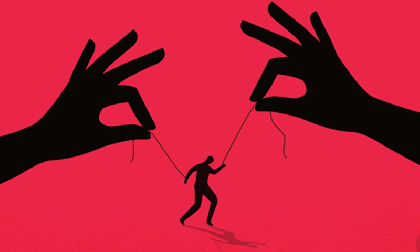Signs of Manipulation in a Relationship
Manipulative behaviours in a relationship are often subtle and insidious, creeping into your life in ways that can be difficult to detect. Recognising these behaviours is critical for maintaining a healthy relationship and personal well-being. Here are various behaviours that can arise, how to recognise them, and strategies to address them.
1. Gaslighting
Gaslighting is a form of psychological manipulation where a person makes their partner doubt their own memories, perceptions, or judgements. It often involves statements like "You're too sensitive," "That never happened," or "You're imagining things." This behaviour can be incredibly harmful, leading to a loss of self-esteem and trust in one's own judgement.
Recognition
If you find yourself constantly questioning your reality or feeling confused about past events in your relationship, it could be a sign of gaslighting. Other signs include feeling isolated, being lied to, or having your experiences trivialised.
2. Guilt-Tripping
Guilt-tripping involves making someone feel guilty in order to control or manipulate their actions. It can take the form of comments like "After all I've done for you," or "You don't care about me."
Recognition
If you often feel like you're walking on eggshells to avoid making your partner feel bad, or if you're doing things out of guilt rather than desire, it may be a sign of guilt-tripping.
3. Silent Treatment
The silent treatment is a passive-aggressive form of manipulation where one partner ignores or refuses to communicate with the other. This behaviour is used as a form of punishment and can be emotionally distressing.
Recognition
If your partner consistently refuses to engage in conversation, especially after a disagreement, and uses silence as a weapon, it's a clear sign of a manipulative tactic.
4. Love Bombing
Love bombing is an overwhelming display of affection and attention used to gain control or influence over someone. It often involves excessive communication, gifts, and compliments.
Recognition
If the intense affection feels overwhelming or seems to be used to sway your decisions, it might be love bombing. It's especially concerning if such affection disappears suddenly or is used to justify abusive behaviour.
5. Isolation
Manipulators often try to isolate their partners from their support network. This can be achieved by criticising friends and family, monopolising time, or even moving to a new location.
Recognition
If you find your social circle shrinking or feel discouraged from seeing loved ones, it could be an attempt at isolation.
6. Financial Control
Financial control is a form of manipulation where one partner exerts undue influence over the other's financial resources. This can include controlling how money is spent, limiting access to bank accounts, or making all financial decisions without input.
Recognition
Feeling powerless over your financial situation or constantly needing to justify expenses can be a sign of financial manipulation.
7. Threats and Ultimatums
Threats and ultimatums are used to force compliance through fear. This could include threats of ending the relationship, self-harm, or other forms of emotional blackmail.
Recognition
If you feel like you're constantly trying to avoid triggering a negative reaction or being given "either/or" scenarios, it’s a red flag.
8. Overdependence
Overdependence is when one partner excessively relies on the other for emotional, physical, or financial support, often at the expense of the other's freedom and well-being. This can manifest in behaviours where one partner insists on being involved in all aspects of the other's life, making them feel responsible for their happiness and well-being.
Recognition
If you feel overwhelmed by your partner's constant need for attention and support to the point where it affects your personal life and responsibilities, it could be a sign of overdependence.
9. Shifting Blame
This involves a partner consistently shifting the blame for their actions or the relationship's problems onto the other person. Common phrases might include "You made me do this" or "If only you had/hadn't done that."
Recognition
Recognise this behaviour if you find yourself frequently being blamed for issues, regardless of the situation, or feeling responsible for your partner's actions and emotions.
10. Victim Playing
In victim playing, a partner portrays themselves as the victim in all situations to gain sympathy and manipulate the other. This tactic shifts the focus from their behaviour to their partner's perceived shortcomings or lack of support.
Recognition
If your partner often plays the victim in arguments or situations, especially to deflect from their actions, it's a sign of manipulative behaviour.
11. Intermittent Reinforcement
Intermittent reinforcement involves unpredictable rewards and punishments to create a sense of uncertainty and dependency. This can be seen in cycles of kindness followed by cruelty, or affection followed by neglect.
Recognition
If your relationship is characterised by unpredictable cycles of positive and negative behaviour, making you constantly uncertain and anxious, this could be a sign of intermittent reinforcement.
12. Negging
Negging is a manipulative tactic where one partner gives backhanded compliments or subtle insults to undermine the other's self-esteem, making them more emotionally dependent and seeking approval. For example, a partner might say, "You're pretty smart for someone who doesn't read much" or "I like how you don't care about the way you look."
Recognition
This behaviour can be identified if you notice that compliments from your partner often leave you feeling insulted or less confident. If you find yourself constantly trying to earn their approval or feel good enough, it might be a sign of negging.
The Impact of Manipulative Behaviours
Manipulative behaviours can have profound psychological effects on the victim. These include:
Reduced self-esteem
Constant criticism and gaslighting can lead to self-doubt and a decreased sense of self-worth.
Anxiety and Depression
The stress and confusion caused by manipulation can contribute to mental health issues.
Dependency
Isolation and love bombing can lead to an unhealthy dependency on the manipulator.
Loss of Trust
Being manipulated can make it difficult to trust others in the future, impacting future relationships.
Addressing These Behaviours
Recognising manipulation is the first step towards addressing it. Here’s how you can handle manipulative behaviours in a relationship:
Acknowledge the Issue
Regularly assess your feelings and the health of your relationship. If these behaviours are present, acknowledge their impact on you. Be honest with yourself about what is happening. Denial can be a significant barrier to addressing manipulation.
Communicate Clearly
If you feel safe, try to discuss your concerns with your partner. Be clear about what behaviours you find manipulative and how they affect you. Don't participate in the cycle of blame, victimisation, or overdependence. Maintain your independence and perspective.
Set Boundaries
Establishing firm boundaries is crucial. Let your partner know what is and isn’t acceptable to you.
Seek Support
Reach out to friends, family, or a professional therapist. Support networks are vital for guidance and emotional support.
Prioritise Self-Care
Look after your mental and emotional well-being. Engage in activities that boost your self-esteem and independence.
Consider the Relationship’s Future
Sometimes, the best course of action might be to leave the relationship, especially if your partner is unwilling to acknowledge or change their behaviour.
Conclusion
Manipulative behaviours in a relationship are harmful and can lead to long-term emotional damage. Recognising these behaviours is the first step to addressing them. It’s important to communicate, set boundaries, and seek support. Always prioritise your well-being and consider the health of the relationship. Healthy relationships are based on respect, trust, and mutual understanding, not manipulation and control.



















